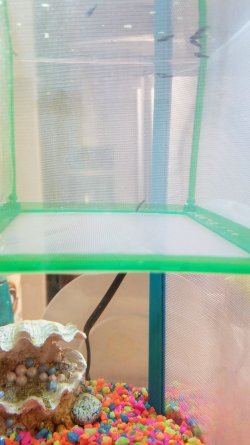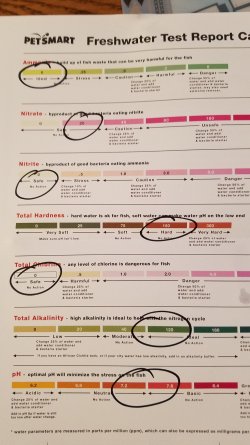Attached is the water test from the pet smart I was standing right next to the person doing the tests and watched them do it this is accurate. Was told no need to change the water to the 50/50. Some of our fish ended up with ich I also asked them about what to so with that they told me to take the brand new filter out and toss it due to some of the ich being attached to it and medicate every 48 hours of only doing 5mil due to the babies being sencative. I ended up loosing 5 out of 6 of the babies but this one seams to be thriving well and is doing good with the medication. Yes I already took the filter out and tossed it and turned it off and medicated this morning all the others are doing good.
You don't listen do you? Clean water is often the best pick-me-up for ill fish. If the medication you have is working, follow the instructions religiously and make sure that after your ick has cleared
you stop tossing out your filter media and that you start performing regular water changes. You won't believe how well your fish will be when you take the time to care for them. They are much more active, playful, and a delight to watch. My corydora actually love it when I do water changes, they swim around the gravel siphon and play in the current when I change the water. Fish can have great personalities, but when they are kept in unhealthy conditions they do not thrive, simply survive.
I'd advise against using medicine and taking direct advice from people at pet stores like petsmart and petco. They often are ill informed or just spout out whatever answer they need to sell a product. I've had
great luck with this product called Herbtana, it treats for parasites like ick, and more, by naturally stimulating a fishes immune system and starving the parasites. The best part is that it's safe for your bacteria, plants, and ALL your fish! I just recently finished a ten day treatment of this stuff and my fish are all cleared up for their ick.
I'm not saying meds are bad, often times they are necessary, but they are destructive to your bacteria colony and cause undue stress on other fish. Sometimes they make a sick fish even worse.
Since you chucked your filter media for the second time after you have medicated you are going to need to monitor your water parameters every day as well as to do more often water changes while your tank recycles itself. Without a present bacteria colony you'll see high rises in ammonia, nitrates, and nitrites. All the medicine in the world won't do you any good if your tank water is poisoning the fish.
And also, nitrates and nitrites and ammonia should all be zero. That means a water change is needed when you see them at anything higher than zero.



